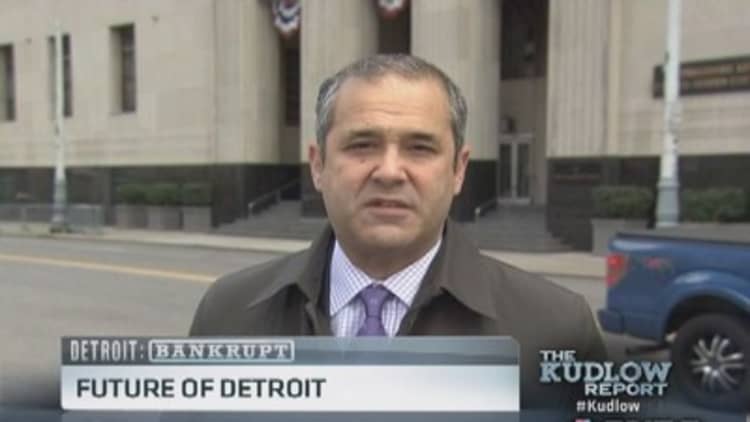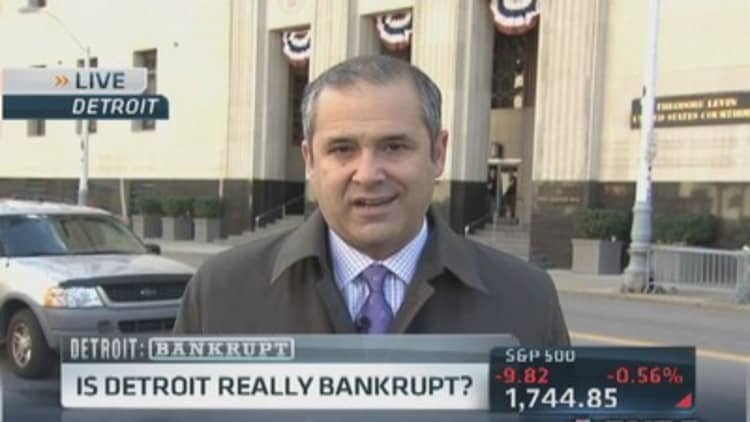Detroit's emergency manager painted a picture of a city in dire financial straits in testimony on Monday, with budgets so strained that bumpers were falling off police cars, as he laid out the city's case of why a municipal bankruptcy filing was the only way back to health.
Kevyn Orr, the emergency manager, sparred with a lawyer representing city retirees in the fourth day of Detroit's landmark bankruptcy eligibility trial.
Michigan Governor Rick Snyder began to testify Monday afternoon, a rare court appearance by a sitting governor.
(Read more: Detroit banker: Pension cuts go without saying)
Ahead of Snyder's testimony, about 100 protesters, a handful carrying signs with photos of Snyder with devil's horns, marched outside the Theodore Levin United States Courthouse in downtown Detroit chanting "Hey, hey, ho, ho, Rick Snyder has got to go."
Orr noted that a number of lawsuits were filed in the weeks before the city filed for bankruptcy on July 18, saying that the litigation made it clear that city creditors were not willing to make compromises on reducing Detroit's debt.

"Given the amount of litigation, it was clear to me there was going to be no other way to pursue a comprehensive and orderly restructuring of the city's problems in a expeditious way," Orr said.
In describing the level of Detroit's financial distress and how that was affecting life in the city, Orr said, "Every neighborhood, even the good ones, had some degree of blight."
Orr said that Detroit's financial status was "shocking" when he first took office, saying that no knowledgeable person ever has disputed his claim that the city is insolvent.
Detroit's public sector unions, retirees and pension funds have all objected to the city's filing. They say the city negotiated in bad faith and argue that Michigan's constitution prevents retiree pensions from being cut. The trial in federal court is being held to determine if Detroit is eligible for bankruptcy under Chapter 9 of the federal bankruptcy code.
Monday's morning session featured testy exchanges between Orr and Anthony Ullman, an attorney who represents a committee for the city's 23,500 retirees. The dispute between witness and lawyer ranged from the constitutionality of Orr's actions to his style of answering questions in court.
(Read more: Is Detroit eligible for bankruptcy?)
Orr said he believes federal law trumps state law when it comes to pensions in bankruptcy. He was responding to a question from Ullman about whether Orr was upholding an oath he took to become emergency manager to protect the Michigan constitution by proposing the pension cuts.
As the two sparred, Ullman said that Orr was expounding in his replies when a simple "yes" or "no" would suffice. Orr said he needed to explain his answers because often the questions were too complicated for one-word replies.
Orr's testimony was suspended to allow Snyder to testify.

Orr in testimony earlier Monday painted a grim picture of life in Detroit, from a fire department with faulty equipment to blighted neighborhoods where school children say they are afraid of "everything" as they walk to school or their bus stops, at the start of what could be a pivotal day in the city's bankruptcy eligibility trial.
Detroit in the proceeding is seeking to prove it is bankrupt and entitled to protection from creditors under the federal Chapter 9 municipal bankruptcy law. City unions, pension funds and retirees are among those opposing Detroit's bankruptcy petition, the largest-ever municipal bankruptcy filing.
Resuming testimony from late Friday, Orr on Monday said when he arrived in March, it was clear the city was in dire financial straits. "I knew things were bad. It was somewhat shocking just how dire it was," Orr testified.
He added, "No one, on a serious basis, has ever disputed to me that the city is insolvent."
(Watch: Hot areas of Detroit housing market)
To be eligible for bankruptcy, Detroit must prove it is financially insolvent, that it negotiated in good faith with creditors or there were too many creditors to make negotiation feasible. It also must establish that it has a desire to restructure its finances.
Orr said that if the city is not allowed to be restructured under bankruptcy protection there is a chance that it could revert to what he called unsustainable path it has been on for decades, particularly since 2000.
Detroit is some $18.5 billion in debt, which Orr says includes $3.5 billion in pension debt.
The birthplace of the automotive industry, Detroit was once the fifth-largest U.S. city, with a population peaking in the 1950s at 1.8 million. Today, the population is under 700,000, with 25 percent of residents having moved out during the last decade.
—By Reuters

